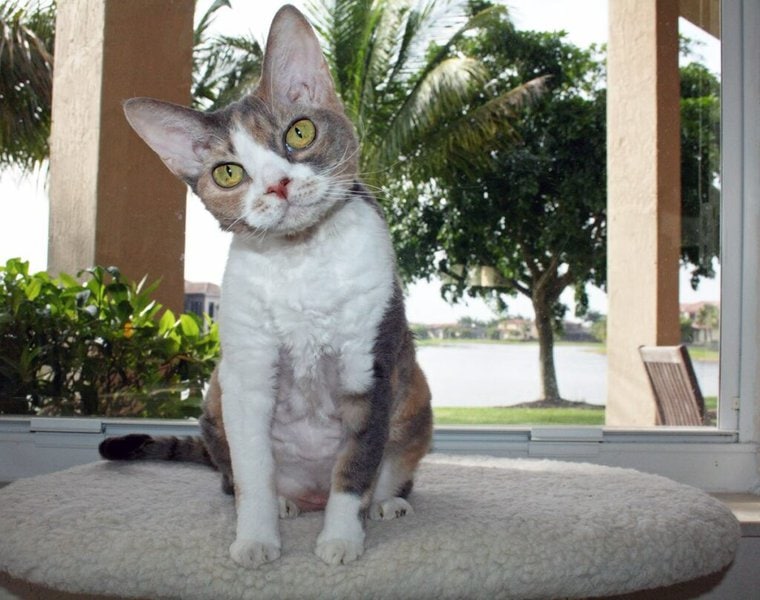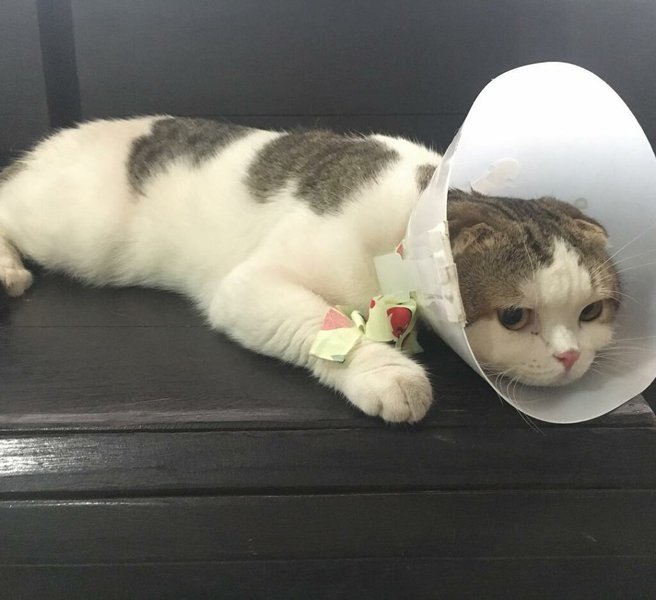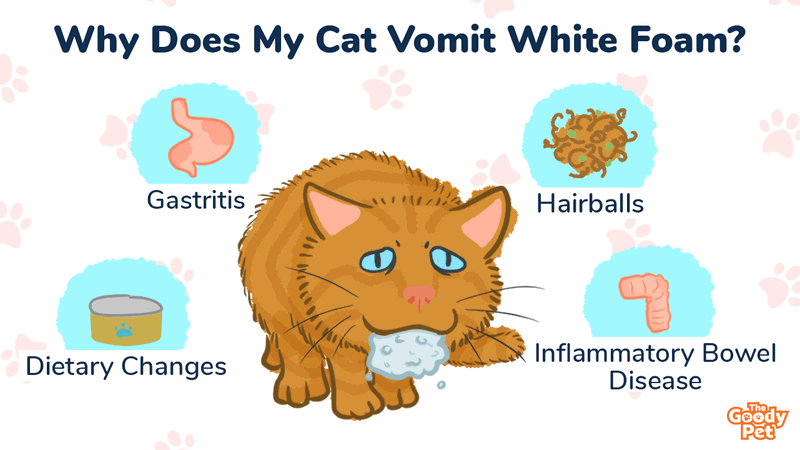Every cat owner has had to clean up cat vomit one or two times. Your cat vomiting occasionally is totally normal and should not worry you. However, if your cat starts vomiting white foam frequently, this is not a good sign.
Why do cats vomit white foam? Vomiting white foam in cats can be caused by various issues, including dietary changes and conditions like gastritis, inflammatory bowel syndrome, and hairballs. If the vomiting doesn’t let up after a few days, you need to seek veterinary attention for your kitty.
If you’re concerned because your kitty is routinely vomiting white foam, you’re in the right place. This article will address all your concerns, including why your cat is vomiting white foam, whether you should feed your cat after vomiting, and what you can give your kitty for vomiting. Before getting into all that, however, let’s see what you should do if your cat is vomiting white foam.
What Do I Do If My Cat Throws Up White Foam?
It is possible to treat your cat for vomiting at home if the vomiting is not very severe. If you’ve noticed your cat vomiting white foam, here’s what you need to do…
Observe Your Cat
Before you start doing anything, you first need to observe your feline buddy’s behavior. If the cat looks normal after throwing up, with normal behavior, appetite, and bowel movement, this could be a one-off thing that will resolve on its own. If the vomiting continues, however, you should do the following:
Withhold Food
Avoid giving your kitty food for a couple of hours while you continue observing them. Withholding food provides ample time for any stomach irritation to let up. If your cat goes for a few hours without vomiting, give a few tablespoons of water and continue observing your cat.
Give Bland Food
If your cat doesn’t vomit even after giving small amounts of water, you can now start giving very small amounts of bland food every few hours. A good option is boiled chicken. Continue feeding the bland diet for the next two days, and if there’s no vomiting, gradually switch back to your cat’s normal diet.
Can I Help My Cat Throw Up?
If you suspect that your kitty is vomiting because they’ve ingested something potentially toxic, you could be tempted to help your cat throw up in order to eliminate the toxic substance from their gut.
Unfortunately, many of the commonly used ways of inducing vomiting in cats, such as giving salt, hydrogen peroxide, olive oil, or even sticking a finger in your cat’s throat are not very safe for your cat, and could cause other unexpected problems.
The best thing to do if your suspect that your cat has ingested something toxic is to call a vet, who will then advise on the best course of action.
Why Would A Cat Vomit White Foam?
If your cat keeps throwing up white foam, this could be caused by…
Dietary Changes
If your cat is expecting food, their stomach will start preparing by releasing hydrochloric acid and gastric juices to digest the food.
However, if the food doesn’t arrive in the stomach, these acids and juices can cause irritation. To ease the irritation, your cat will vomit out these stomach fluids, which appear as white foam.
This usually happens if you’ve adjusted your cat’s feeding schedule, or when you’ve changed your cat’s diet and they reject the new food.
Hairballs
As they groom themselves, cats will swallow some of the fur from their coats. While most of it gets passed out with poop, the fur can sometimes accumulate in your kitty’s stomach and form hairballs, which are very irritating to your cat.
If this happens, your cat will vomit white foam as they try to expel the hairballs.
Gastritis
Gastritis is an inflammation of the stomach lining. This usually happens when your cat has ingested something they shouldn’t.
When this happens, your cat will vomit to expel the unwanted substance from their stomach, which could come out together with white, foamy liquid.
Inflammatory Bowel Disease
Inflammatory bowel disease (IBD) is another common reason why cats vomit white foam. This condition is usually accompanied by diarrhea. If your suspect IBD, you should take your cat to the vet immediately.
When Should I Worry About My Cat Vomiting?
You should take your cat to the vet for vomiting if the vomiting has been going on for more than 2 days, or if your cat is also showing other symptoms like lethargy, abdominal pain, loss of appetite, pain, and distress, diarrhea, bloody stool, fever, or blood in vomit.
You should also take your cat to the vet if they’ve been previously diagnosed with another serious health condition.
What Can I Give My Cat For Throwing Up?
If your cat has been throwing up, there are some things that you can give them to help settle the stomach upset and stop the vomiting. These include:

Pumpkin
Pumpkin is a great natural remedy that you can give your cat for vomiting. Pumpkin helps prevent vomiting in two ways.
First, the high fiber content in pumpkin helps your cat pass any ingested fur, and therefore prevents the formation of hairballs, which are a major cause of vomiting in cats. The high fiber content in pumpkin also helps treat constipation, which can also lead to vomiting.
If your cat has been vomiting, Libby’s 100% pure pumpkin cans, made from all-natural ingredients, is a great option to help bring the vomiting to an end. This can be mixed with the bland diet you’re going to feed your cat after the vomiting has ceased.
Probiotic Yogurt
Giving your cat probiotic yogurt can also help with vomiting. Yogurt contains a good amount of healthy bacteria, which can restore the natural balance of bacteria in your kitty’s gut and soothe the stomach upset.
Anti-Vomiting Medication
You can also give your feline buddy some anti-vomiting medication to soothe their stomach. Examples of such medications include maropitant citrate, metronidazole, and famotidine. However, these should be used only after consulting your vet.
Can I Give My Cat Pepto-Bismol For Vomiting?
While Pepto-Bismol can be given to vomiting cats, we do not recommend it. This is because one of the active ingredients in Pepto-Bismol, when administered in excessive amounts, Aspirin can cause a toxic reaction in cats.
Determining the correct dosage for your cat can be very difficult, which is why we do not recommend giving Pepto-Bismol to your cat. If it is absolutely necessary for you to give Pepto-Bismol to your feline buddy, only do so under the directions of a vet.

Should You Feed A Cat After It Vomits?
It is not advisable to give your cat immediately after they vomit, since this can irritate their stomach further and cause even more vomiting.
What you should do instead is to put your kitty into fasting for a few hours as you observe them.
If the vomiting continues, even after withholding food, you’ll need to take your cat to the vet, since this could be a sign of a serious problem causing the vomiting.
However, if the vomiting stops after you withhold food, you can start feeding your feline buddy small amounts of highly digestible food that is unlikely to aggravate the stomach irritation. If your cat is able to keep this down, you can then increase the portions and revert to their normal diet.
Should I Give My Cat Water After Vomiting?
When a cat is vomiting, they lose fluids very fast, which can lead to dehydration. Therefore, it is very important to replace the lost fluids. It is possible to do this by giving water.
Giving your cat lots of water after they’ve vomited, however, can cause further vomiting, so what you should do instead is to give about a tablespoon of water every one hour.
Sometimes, your cat will still vomit even after taking such small amounts of water. So, how do you rehydrate your cat if they can’t keep down water?
One good option is to provide your cat with some ice cubes. Even if they are unable to keep down water, licking on ice cubes can help your cat get the much needed moisture without upsetting your cat’s stomach further. Alternatively, you can give your cat unflavored Pedialyte.
If your cat is vomiting and they have not been able to keep down any fluids for more than 12 hours, you should rush them to the vet, since they are at a very high risk of dehydration.
Related Questions
What Does The Color Of Cat Vomit Mean? The color of your cat’s vomit can give you clues to what is happening in your cat’s body to cause the vomiting. For instance, white, foamy vomit usually shows that your cat is vomiting hydrochloric acid and gastric juice, while reddish vomit could be a sign of internal bleeding.
Why Does My Cat Keep Gagging But Not Throwing Up? If your cat keeps gagging but they’re not throwing up, this is usually a sign that they have hairballs that they are unable to expel. However, dry heaving in cats can also be caused by other serious conditions, such as kidney disease, something foreign in their throat or stomach, or gastroenteritis.
Is It Normal For A Cat To Throw Up After Vaccinations? It is possible for a cat to throw up after they have received a vaccination shot. This is a sign that your feline buddy is having an allergic reaction to the vaccine. If the vomiting continues for more than a day, or if it is accompanied by other worrying symptoms, you should get in touch with your vet immediately.





